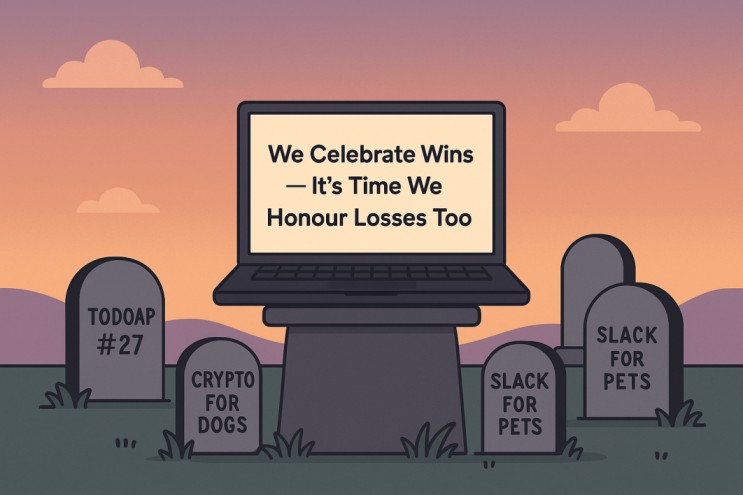We Celebrate Wins, it's Time we Start Honoring Losses Too
Because every win starts with a wound
June 17, 2025
 SaaS Graveyard - Image generated with ChatGPT
SaaS Graveyard - Image generated with ChatGPT
Everyone loves a good story. "The overnight launch that made $10K". "Launched on Product Hunt, now I'm retiring in Bali". These are just a few of the headlines we see on indie sites.
But what about the other 99 projects? You know, the ones that died alone in a Notion doc? Those deserve some love too. Behind every indie success are dozens of silent failures, projects that never took off, ideas that died quietly, founders who got burned out. We rarely talk about these yet they hold the most valuable lessons. I think its time we stopped sweeping them under the rug.
That's why I built Indiefails, a public database of failed indie projects. The mission is simple: to give founders a space to share what didn't work, why it didn't work and lessons learned in the process. Think of it as a postmortem party. Bring your broken dreams, leave with perspective. By documenting this stories, IndieFails aims to turn failure into a shared resource for growth, reflection and better decision making.
The Problem
The reality is that most indie projects fail but you wouldn't know it from scrolling through X (Twitter) or ProductHunt. All you see are "launched yesterday, $10K MRR today" posts and perfect dashboards.
Meanwhile, the vast majority of failed projects disappear without a trace. It's like a graveyard of half-built apps and abandoned domains piling up in silence. It is also like we are secretly failing in private while pretending we are one launch away from passive income paradise.
This creates a skewed perception of what building something truly looks like. In reality, it's messy, uncertain and often unsuccessful. But here's the thing: failure is normal. Hiding it isn't helping anyone. It just makes the rest of us feel like we are doing it wrong.
The Spark
The disconnect between reality and what is publicly shared is what first sparked the idea for IndieFails.
As I started basking in the indie hacker space, I found myself surrounded by projects that didn't work out, my own included. Yet there was no place to tell this stories. I figured if we are all crushing and burning, we might as well, do it together and maybe, learn a thing or two along the way.
Indiefails is my attempt to make that space where honesty is valued as much as achievement.
Tech stack
I built Indiefails with a focus on simplicity, speed and ease of contribution. The frontend uses Next.js, a powerful React framework that needs no introduction. There is almost no backend code except Firebase for handling real-time data. There is no authentication as I want to keep things very simple.
Keeping things simple resulted in a rapid development which allowed me to launch IndieFails in a week. On the UI side, I used Shadcn/ui, a React UI library that works perfectly well with TailwindCSS. The app is deployed on Vercel which offers seemless integration with Next.js.
This modern stack allowed me to move quickly while ensuring the platform is scalable and easy to contribute to.
What I hope to achieve
Honestly, I just want failure to get the respect it deserves. At its core, IndieFails is about shifting the perception around failure. Not every project is able to pull some money through Stripe.
Sometimes you spend three weekends building an app no one wanted and I believe that should also be celebrated. I want to create a space where indie hackers and founders can share their failed projects without fear or shame because failure is often our best teacher.
By making this stories pubic, my hope is that others can learn from them, avoid the same mistakes and feel less alone in their own journeys.
Moreover, I want to help normalize the idea that not every project needs to succeed to be valuable. Sometimes, the lessons, the connections or the skills gained are the real win.
If Indiefails can help even a handful of people feel seen, encouraged or better informed, then it's doing its job.
Launch and Community
IndieFails is already live and open for contributions. The response so far has being encouraging. At the time of writing this piece, I have received three failed projects from three bold founders respectively.
My goal now is to grow a small but honest community around these stories. Anyone can browse the archive and if you've got a project that didn't quite make it, you are more than welcome to submit it. No shame, no fear, just real builders.
Over time, I want IndieFails to become a valuable resource that encourages transparency and helps indie hackers navigate their own journey with more clarity and confidence.
If you have a project that did not go exactly as planned, you can click here to access the submission form on IndieFails
Closing thoughts
As someone navigating the indie hacker route. I've had my fair share of unfinished projects. Early on I thought success was all about momentum and big wins but I have come to realize that its just as much about the things that didn't work. Failure has thought me things I couldn't have learned any other way. It has thought me how to build better and how to be resilient.
This is why IndieFails matters. It is more than a graveyard. It is a reminder that failure isn't the opposite of success, it's part of it. By sharing these stories, we are not just closing chapters, we are opening conversations. And for anyone building in public, that honesty can be just as valuable as any product launch.